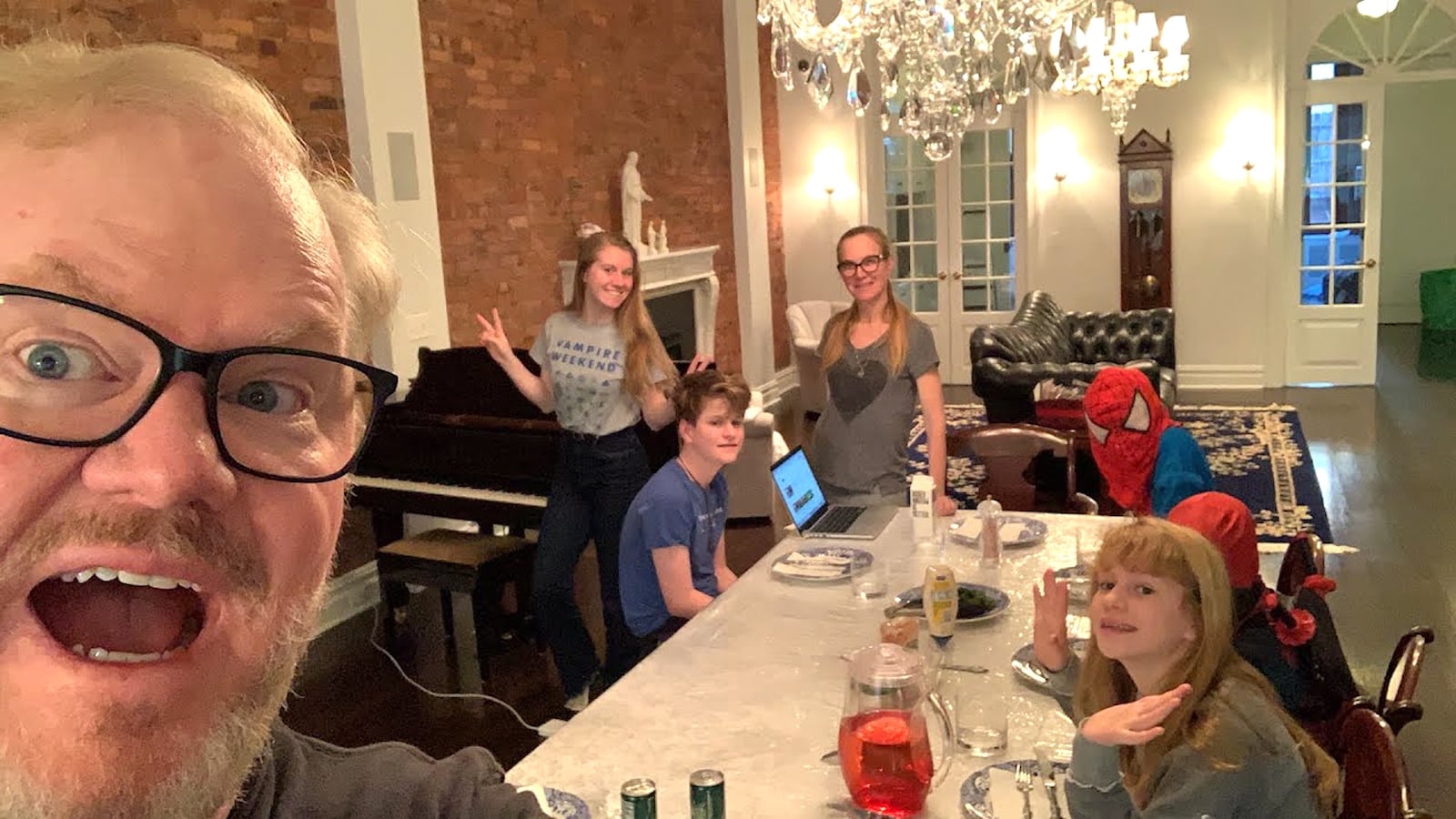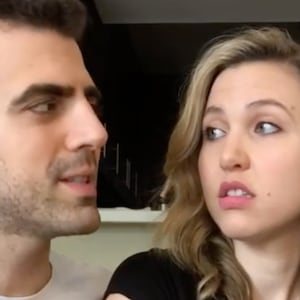Early last week, as everything in Los Angeles was shutting down, Jeff Ross drove to an open mic in North Hollywood where a handful of young comedians had gathered. He had just been forced to cancel or postpone all of the shows on his Bumping Mics tour with fellow stand-up Dave Attell. But he wanted to get on stage one last time.
“I couldn’t help it,” he tells me by phone. “I just peeked in for two minutes.”
In a scene that resembled a support group meeting, about 15 comics were sitting the requisite six feet apart in a small room. No audience members had shown up so they were trying out new material for each other.
“I’m not saying it was safe,” Ross says. “Maybe they should be reprimanded for gathering. But there’s also a certain beauty in the simplicity of it. I need to be around other comics. We’re like a cult.”
Ross, who’s also known as the Roastmaster General, stood up in front of the room and told a few jokes about the coronavirus. He tries a few out on me: “Coronavirus is killing off the old people. I think it’s just God’s way of saying don’t vote for Joe Biden.”
And then: “I went to Walmart and they were out of toilet paper and hand sanitizer. I didn’t even realize the coronavirus was happening, I was just planning to go to Dave Attell’s house.”
And finally: “I traded my Purell stock for Coachella tickets so now I’m depressed.”
It was the last time he performed comedy in front of people.
The coronavirus pandemic is currently decimating entire industries. Airlines are losing hundreds of millions of dollars a month. Top Chef host Tom Colicchio is warning that 75 percent of restaurants may never be able to reopen. Momofuku’s David Chang thinks it could be 90 percent. Hollywood as a whole will be hit hard, but unlike movies and TV, live comedy needs a crowd. Until people can gather in groups of more than 10, stand-up comedians and the servers, bartenders and other workers who keep comedy clubs running are out of a job.
“I don’t know when we come back from this,” comedian Cameron Esposito says from her home in L.A. “For anybody who works in live performance, it’s very strange to think about a job just not being there for you. This job just won’t exist.”
Like most stand-up comics, Esposito, who doesn’t seem to be joking when she tells me that she “slept with a hatchet” the other night, makes most of her income through live shows. Her nationwide tour was supposed to start this weekend in Los Angeles before all of the dates got canceled.
“One thing that’s a little scary financially is that right before a tour, that is when any comic or musician is the most financially drained,” Esposito explains. “You go on tour, make all your money from that tour and then that’s what you live on for a bunch of months. It was wild to have a tour canceled because that means I’m at the dip in the rollercoaster.”
In the midst of the crisis, Esposito is about to release her hilarious and moving new memoir Save Yourself this Tuesday, March 24. In lieu of live readings or stand-up shows, she has started hosting Zoom conversations for fans along with other queer writers like Roxanne Gay and Lydia Polgreen.
It’s one of many new ways comedians are trying to connect with audiences remotely now that they can’t perform live. They’re still taping podcasts from their garages and the late-night hosts have been broadcasting unexpectedly innovative shows from their couches. It’s not the same as the intoxicating energy of live performance, but it’s something.
Under normal circumstances, Jim Gaffigan would never livestream his family dinners to thousands of people on YouTube. These are not normal circumstances.
For the past week, anyone who wants to has been able to virtually eat dinner with the comedian, his wife and writing partner Jeannie, and their five children through a series he’s calling “Dinner with the Gaffigans.”
The idea is to make fans who are cooped up at home, especially those who are single, feel less alone. “There are people in quarantine who are essentially like me when I was 30,” Gaffigan says. “I would have been stuck in my apartment by myself.”
He’s doing it for people who are “bored,” but says there has been nothing “boring” for him about suddenly having to homeschool his five kids. “The Walking Dead didn’t really capture the ongoing petty arguments that we experience when we’re in quarantine,” he jokes. “And there’s no escaping it.”
Asked how long they’ll keep live-streaming their dinners, he replies, “Until we kill each other.”
Comedians Sam Morril and Taylor Tomlinson, meanwhile, recently decided to launch a web series about their quarantined relationship on Instagram. Morril, who lives in New York, was supposed to perform in Tempe, Arizona last weekend but ended up canceling at the last minute and quarantining with his relatively new girlfriend in her Los Angeles apartment.
Initially, the pair had conversations about whether it was “ethical” to be promoting their shows that hadn’t been canceled yet. “Hey, I know things are crazy right now and everyone’s afraid, but can you come see me in a tight, packed showroom and eat chicken strips really close to a stranger?” Tomlinson jokes. “Because I still need validation.”
“The government doesn’t really know what’s going on,” Morril adds. “So how would we know? We’re comics.”
“It’s so morbid,” Tomlinson says. “I was doing radio interviews a week ago with guys who were like, ‘Coronavirus, anybody have it? Call me!’” People are still telling her, “Well, at least everyone’s inside watching streaming content,” referring to the presumably increased number of people who will check out her new Netflix special Quarter-Life Crisis. “Yeah, I mean I guess more people will see our stuff, but it’s kind of not worth it.”
Among those most worried about the future of the comedy industry is Roy Wood Jr., who had to cancel a slew of shows up and down the east coast planned for the spring.
“I’m not concerned about canceling dates or kicking the ball down the road,” the Daily Show correspondent says. “What I’m concerned about is the clubs that may not be able to survive being closed for three months. I’m not concerned about my dates, I fear for this industry as a whole.”
“It’s a very small margin at some of these clubs,” Gaffigan adds. He’s hopeful that the Comedy Cellar will survive because it’s such a “powerhouse,” but he fears for the future of smaller New York clubs like The Stand or Gotham. Last week, the DC Improv in Washington announced that it had laid off 50 employees. There will be many more layoffs to come.
This past Thursday, Wood took part in the inaugural edition of fellow comic Mike Birbiglia’s #TipYourWaitstaff series. The pair went live on Instagram stories—from their separate apartments—to raise money for comedy club workers who have been laid off during the crisis. On Friday, hundreds of fans tuned in to watch Birbiglia and his friend Gary Gulman work out new material together.
Without the ability to get on stage and work out material, Wood has been listening to old sets and playing around with new jokes as much as he can while stuck at home with his young toddler. He was supposed to be developing a new hour for a special that he planned to tape in the fall, but now that’s unlikely to happen.
“What’s the world going to be like in four or five months?” he wonders. “Will these jokes still be funny?”
In addition to worrying about the comedy clubs, Wood also worries for the comics who don’t have cushy jobs like his Daily Show gig to get them through months without the ability to get on stage.
Erin Jackson is a New York-based comic who doesn’t have significant income from TV, movies or other show business platforms. She makes nearly all of her money performing stand-up in clubs and on the road and everything has been canceled.
“It’s not great,” she says with a sigh. “I think I’ll be OK for a few months. But just because you have money now, you have to live off of that.” Still, Jackson says she’s lucky to have at least some residual income from record sales and writing jobs. “If this had happened at any other year of my career, I would have been done,” she says. Even alternative jobs like driving Uber or bartending are not available. “There is no back-up,” she adds.
Jackson performed for the last time last Sunday night at the Comedy Cellar in the West Village. “It felt like being in a western, like there should be tumbleweeds blowing down West 3rd Street,” she says. “It was eerie. It was weird to see New York like that.” She says the crowd was sparse that night and she “pretty much knew it was the end.”
Also at the Comedy Cellar that night was Jessica Kirson, who put out her first hour-long special Talking to Myself last December. “It’s weird because I kind of knew in my head that it was going to be the last performance for a while and I got emotional,” Kirson says. She told the crowd how sad she was that she wasn’t going to be able to perform for a while because she views stand-up as a form of “therapy.”
“It’s very hard to not do stand-up,” Kirson says from her home on Long Island. “I’m one of those comics who go up every night, sometimes two, three, four, five, six times a night so it’s very hard to not perform.”
Morril similarly worries about being “rusty” when he eventually returns to the stage. “Are pro athletes going to be at their best when they don’t play for months?” he asks. “Being funny is a muscle, you have to work at it.”
“But compared to what other people are going through, so I can’t get on stage for a couple of months?” Kirson adds. “Things could be a lot worse.” Kirson has been receiving some “horribly upsetting” emails from comedy club owners who are not sure they will be able to reopen when all of this is over. “I don’t think people understand what this is going to do to the comedy community,” she says.
Both Jackson and Kirson appear in the final episodes of Comedy Central’s This Week at the Comedy Cellar series, which begins with a disclaimer that the material included was taped before the club temporarily suspended shows on March 15th. “Please stay inside, wash your hands, and take care of each other,” the screen reads. “And when things get back to normal, go see live comedy. Comedians need your support.”
From there, we get a peek at the types of jokes comics were making about the virus in the final days that they were still able to perform live. “Bernie Sanders should not worry about the coronavirus,” Gilbert Gottfried says from the stage. “After all, he survived the 1918 Spanish flu epidemic so he can survive this.”
In another scene, comedian Chris Distephano tries out his bit on Colin Quinn. “How ‘bout this? I just found out Tom Hanks has the coronavirus,” he says. “I got a new script for a movie: Philadelphia 2.”
“You know what?” Quinn says, cracking up. “The rule is, if it’s funny, you’ve got to say it.”
In a desperate attempt to make sense of our current moment, some have been quick to invoke the aftermath of the September 11th attacks. But as these comics can attest, there really is no comparison.
Gaffigan was a working stand-up living in New York on 9/11. Two days later, he went out to do his first spot. “My wife, then-girlfriend at the time was like, ‘You’re crazy,’” he recalls. “And I was like, I need to get out.” He went into the subway and immediately ran into another comedian on his way to the club. “It was Greg Giraldo. And he was like, we have to do this,” Gaffigan says. “This is so different.”
Kirson, who was also living in Manhattan at the time, agrees, saying that she found 9/11 “petrifying” in a very different way. “This is just so much more unknown,” she says. “I don’t feel comforted. It’s a very scary feeling.”
As many people have observed at this point, the patriotic thing to do after 9/11 was to go out into the world and be defiant in the face of terrorism. Now, the right thing to do is #StayHome.
“We can’t say, ‘Fuck coronavirus, we’ll show you!’” Tomlinson, who at 25 years old belongs to the often invincible-feeling Gen Z, says. “No, you’re stupid if you go out. Flattening the curve is under our control and we need to be responsible and stay home if we can.”
And yet as dire as things seem right now, these comedians are ultimately hopeful about the future of comedy.
“I’m kind of reassured that whether it’s a month or eight months or a year, we’ll come back,” Ross says. “We bounce back. Not just as a society but also as an industry of comedians. We just do. We’re super resilient.”
“We’re going to find a way,” Jackson adds. “Everybody’s really going to need to laugh. So we have to find a way to keep doing that.”
Noting that it’s “an enormous privilege to be able to do this silly, goof-around job,” Esposito predicts that “there will be some innovation that comes from this, so at the very least I’m interested to see how comedy will continue through this.”
Ross urges comedians and non-comedians alike to keep finding humor in the horror of the coronavirus. “You can tell jokes just to keep yourself sane or your roommate or your loved one who you’re quarantined with,” he says. “And that’s also important. To be the funny one, to be the one who keeps it light, who doesn’t let the other person get too anxious.”
“Comedy doesn’t always have to be in a room of dozens or hundreds or thousands of people. Comedy is a survival mechanism,” he continues, pointing to the dirty jokes that were just recently uncovered in the previously lost pages of Anne Frank’s diary.
“These are the moments that remind me why I became a comedian in the first place,” Ross adds. He says he first knew he was funny when he was cheering up his mom at 12 years old. “She was sick for years with leukemia and I was a little kid, but I’d make her laugh and it went a long way with her,” he says. “There’s a picture of her laughing in the hospital and that had to mean something.”
“I promise it will all come back,” he says of the live comedy scene. “I don’t know when, but I know it will. It just does. Comedy and laughter are just as essential as food and water.”
For more, listen and subscribe to The Last Laugh podcast.





